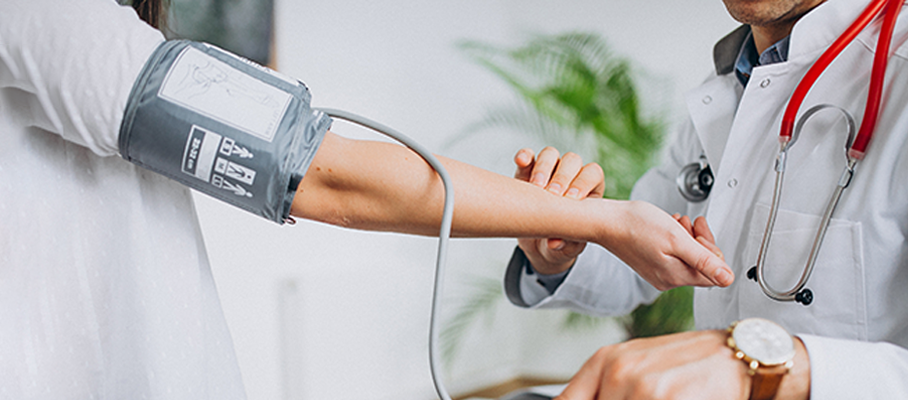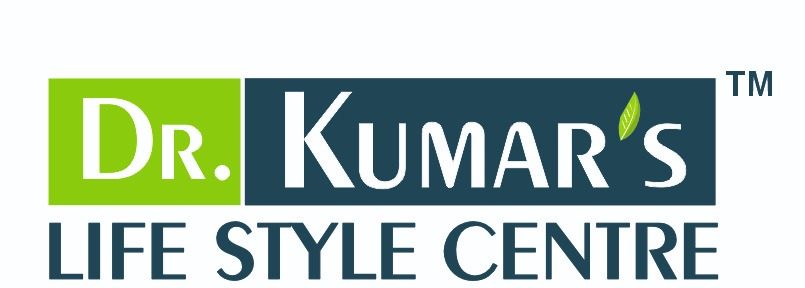
High Blood Pressure (Hypertension): Causes and Symptoms
- Dr Kumar
High Blood Pressure: Understanding the Main Causes and Preventive Measures
High blood pressure, also known as hypertension, is a common medical condition that affects millions of people globally. It is characterized by increased pressure on the walls of the arteries, which can lead to several serious health problems such as heart disease, stroke, and kidney disease. To help you better understand hypertension and how to prevent it, here’s a look at the main reasons for high blood pressure and how to maintain healthy blood pressure levels.
What are the main reasons for high blood pressure?
There are several factors that can contribute to the development of high blood pressure, including:
- Genetics: High blood pressure can be inherited from family members.
- Lifestyle choices: A sedentary lifestyle, unhealthy eating habits, smoking, and excessive alcohol consumption can all contribute to the development of high blood pressure.
- Chronic medical conditions: Certain medical conditions such as diabetes, kidney disease, and sleep apnea can increase your risk of developing high blood pressure.
- Stress: Chronic stress can also cause elevated blood pressure levels.
How to prevent hypertension (high blood pressure)?
There are several steps you can take to prevent hypertension and maintain healthy blood pressure levels, including:
- Exercise regularly: Regular physical activity can help to lower blood pressure levels. Aim to get at least 30 minutes of moderate-intensity exercise most days of the week.
- Follow a healthy diet: A diet that is low in salt and high in fruits, vegetables, and whole grains can help to reduce blood pressure levels.
- Stop smoking: Smoking increases your risk of developing high blood pressure and other serious health problems. Quitting smoking can help to lower your blood pressure and improve your overall health.
- Limit alcohol intake: Excessive alcohol consumption can increase blood pressure levels. Aim to limit your alcohol intake to no more than one drink per day for women and two drinks per day for men.
- Manage stress: Chronic stress can raise blood pressure levels. Find ways to manage stress, such as through exercise, meditation, or talking to a therapist.
How to maintain healthy blood pressure?
To maintain healthy blood pressure levels, it is important to regularly monitor your blood pressure and make changes to your lifestyle if needed. Here are some steps to help you maintain healthy blood pressure:
- Keep track of your blood pressure: Regularly monitor your blood pressure at home or at your doctor’s office.
- Take prescribed medications as directed: If you are prescribed medication for high blood pressure, take it as directed by your doctor.
- Follow a healthy lifestyle: Maintaining a healthy lifestyle, including regular physical activity, a healthy diet, and limiting alcohol and tobacco use, can help to keep your blood pressure at a healthy level.
In conclusion, high blood pressure is a common medical condition that can have serious health consequences if not managed properly. By understanding the main causes of hypertension and taking preventive measures, you can help to maintain healthy blood pressure levels and reduce your risk of developing serious health problems.
Treatment of High Blood Pressure in Ayurveda
Ayurveda is an ancient Indian system of medicine that focuses on the use of natural remedies to maintain good health. In the treatment of high blood pressure, Ayurvedic practitioners may recommend herbal remedies, massage therapy, and lifestyle changes to help regulate blood pressure. Some commonly used herbs in the treatment of hypertension include arjuna, ashwagandha, and Shankhapushpi.
Treatment of High Blood Pressure through Naturopathy
Naturopathy is a holistic approach to health that uses natural remedies to promote wellness. In the treatment of high blood pressure, naturopathic practitioners may recommend dietary changes, stress management techniques, and herbal remedies to help regulate blood pressure. Some common natural remedies used in the treatment of hypertension include magnesium, coenzyme Q10, and omega-3 fatty acids.
Role of Yoga in the Treatment and Management of High Blood Pressure
Yoga is a form of exercise that focuses on physical postures, breathing exercises, and meditation to promote physical and mental well-being. Research has shown that regular practice of yoga can help to lower blood pressure levels by reducing stress, improving circulation, and increasing relaxation. Some yoga poses that may be beneficial in the management of hypertension include the shavasna, forward bending postures, Chandra bhedi pranayam, suksham vyaya.

It is important to note that while natural remedies, such as those used in Ayurveda, naturopathy, and yoga, can help to manage high blood pressure, they should not be used as a substitute for conventional medical treatment. It is always best to consult with a healthcare professional before starting any new treatment for high blood pressure.
There are several factors that can increase the risk of developing hypertension (high blood pressure), including:
- Age: The risk of hypertension increases as people get older.
- Family history: Having a family history of hypertension can increase your risk of developing the condition.
- Obesity: Excess weight, especially around the waist, can increase the risk of hypertension.
- Sedentary lifestyle: A lack of physical activity can increase the risk of developing hypertension.
- Unhealthy diet: Consuming a diet that is high in salt, unhealthy fats, and added sugars can increase the risk of hypertension.
- Smoking: Smoking can damage blood vessels and increase blood pressure.
- Chronic stress: Chronic stress can raise blood pressure levels and increase the risk of developing hypertension.
- Excessive alcohol consumption: Drinking large amounts of alcohol can increase blood pressure levels and increase the risk of developing hypertension.
- Chronic medical conditions: Certain medical conditions, such as diabetes and kidney disease, can increase the risk of developing hypertension.
It is important to understand your risk factors for hypertension and make lifestyle changes to reduce your risk of developing the condition. This can include regular physical activity, a healthy diet, stress management techniques, and avoiding smoking and excessive alcohol consumption.
Top of Form
Diet plays a significant role in the management of high blood pressure (hypertension). The right diet can help to reduce blood pressure levels and prevent the development of hypertension. Some dietary changes that can help to manage hypertension include:
- Decreasing salt intake: A diet high in salt can raise blood pressure levels. Reducing salt intake can help to lower blood pressure.
- Increasing potassium intake: Potassium can help to counteract the effects of salt on blood pressure. Foods high in potassium include bananas, oranges, and spinach.
- Consuming a diet rich in fruits and vegetables: Fruits and vegetables are high in potassium and low in sodium, making them an excellent choice for those with high blood pressure.
- Limiting alcohol consumption: Excessive alcohol consumption can raise blood pressure levels. It is recommended to limit alcohol intake to no more than one drink per day for women and two drinks per day for men.
- Incorporating healthy fats: Foods high in monounsaturated and polyunsaturated fats, such as olive oil, nuts, and avocado, can help to lower blood pressure.
- Choosing whole grains: Whole grains, such as brown rice and whole wheat, can help to lower blood pressure levels compared to refined grains.
- Limiting processed foods: Processed foods are often high in salt, unhealthy fats, and added sugars, which can contribute to the development of hypertension.
It is important to work with a healthcare professional to develop a personalized diet plan that addresses your specific needs. Making small changes to your diet, such as reducing salt intake and increasing potassium intake, can have a big impact on your blood pressure levels.
Herbs can play a role in the management of high blood pressure (hypertension). Some herbs have been found to have blood pressure-lowering effects and may be used as part of a comprehensive approach to managing hypertension. However, it is important to note that herbs can have side effects and interact with other medications, so it is always best to consult with a healthcare professional before starting any new herb-based treatment for high blood pressure. Some commonly used herbs for hypertension include:
- Garlic: Garlic has been shown to have blood pressure-lowering effects and may help to reduce the risk of developing hypertension.
- Hibiscus: Hibiscus tea has been shown to lower blood pressure in some people with hypertension.
- Basil: Basil has been shown to have a mild blood pressure-lowering effect and may be useful in the management of hypertension.
- Cayenne pepper: Cayenne pepper has been shown to have a mild blood pressure-lowering effect and may be useful in the management of hypertension.
- Coenzyme Q10: Coenzyme Q10 has been shown to help lower blood pressure in some people with hypertension.
- Omega-3 fatty acids: Omega-3 fatty acids have been shown to help lower blood pressure in some people with hypertension.
High blood pressure, also known as hypertension, can be prevented and treated through lifestyle changes and medication. Some key precautions include:
- Maintaining a healthy diet: Eating a diet rich in fruits, vegetables, whole grains, and lean proteins can help prevent high blood pressure.
- Exercising regularly: Physical activity, such as walking, cycling, or swimming, can help lower blood pressure levels.
- Managing stress: Stress can cause an increase in blood pressure, so it’s important to find ways to manage stress, such as through relaxation techniques or exercise.
- Limiting alcohol and sodium intake: Consuming too much alcohol and sodium can lead to high blood pressure, so it’s important to limit these.
- Taking prescribed medication: If lifestyle changes aren’t enough, a healthcare professional may prescribe medication to help manage high blood pressure.
It’s important to work with a healthcare professional to determine the best approach for preventing and treating high blood pressure. Regular monitoring of blood pressure levels and making necessary lifestyle changes can help keep blood pressure under control.
Dr. Kumar’s lifestyle Center’s Ashwagandha Extract, Cleanzer capsule, Regular multivitamins, are very useful for preventive and treatment of high blood pressure.
Tags – high blood pressure ayurvedic medicine, high blood pressure best medicine, high blood pressure but no symptoms, high blood pressure causes, high blood pressure diet and exercise, how to treat high blood pressure naturally, hypertension treatment, treatment of high blood pressure through naturopathy,
